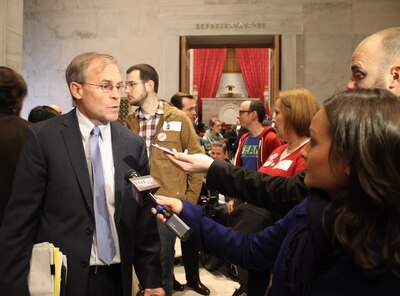School voucher supporters who have had their hopes dashed for years in Tennessee’s General Assembly are more hopeful than ever about a new round of bills ramping up this week at the state Capitol.
Conversely, voucher opponents say they’re facing likely the biggest fight in the state’s history over proposals that they view as an assault on public education.
Newly elected Republican Gov. Bill Lee is staking his political capital on two controversial bills aimed at giving parents more education choices for their children.
One would put taxpayer money into education savings accounts for some families to spend on private or parochial schools or other private education services. Like traditional vouchers, the new type of vouchers eventually would be likely to siphon off funds that now go to public schools. The other proposal would create a new state entity to authorize new charter schools, possibly circumventing their local school boards.
At stake is a battleground state in the tug-of-war between those who want to use taxpayer money to give parents more education choices and others who say that approach diverts money from already underfunded public schools. And for school districts in Memphis and Nashville, which could feel the most impact, the plan would escalate their 3½-year court battle with the state over the adequacy of school funding.
Both of Lee’s proposals have the backing of powerful lawmakers and appear poised to jump out of the gate quickly. And while it’s uncertain whether that momentum will last, a handful of factors are aligning in their favor this time around.
In the last two years, voucher legislation either sputtered early or failed to launch amid angry pushback from school boards and teacher groups across Tennessee, as well as concern about political liabilities in an election year. Republican Gov. Bill Haslam, who left office in January, was mostly lukewarm about those proposals after the failure of a pilot voucher program that he backed early in his eight-year administration.
Meanwhile, the state’s charter school law was overhauled in 2017, but still made school boards the primary gatekeeper for opening and closing the publicly funded but independently operated schools.
What a difference one election can make.
Lee cruised to victory last year over a competitive field in his first run for political office and quickly named three leaders from pro-voucher groups among his key policy advisers. On the campaign trail, the Williamson County businessman pledged to give families more education options, but he didn’t start revealing details about how he would accomplish that until this month.
Now his backers say Lee’s substantial margin of victory represents a mandate from voters on his “parent choice” proposals.
“What has put some wind in our sails is that Gov. Lee made this issue front and center in his campaign and he won by 20 percent,” said Rep. Bill Dunn, a Knoxville Republican who will shepherd Lee’s voucher proposal in the House. The measure would create an education savings account program for students in districts that have three or more schools in the state’s bottom 10 percent — currently impacting six school systems in five counties.
Dunn has sought repeatedly to bring vouchers to Tennessee and came close in 2016 when he almost got his bill to a full vote on the House floor. But his chamber has held the line against such proposals, while the Senate has approved vouchers three times.

Now the House looks significantly different, and Dunn has ascended to the No. 2 House leadership position. While there’s still a Republican majority in both chambers, voucher proponents hope that heavy turnover from November’s elections weakened the coalition of Democrats and rural Republicans that consistently has voted down vouchers. They especially hope that rural freshman lawmakers will be anxious to beef up their conservative credentials by aligning with a popular new governor.
In the Senate, education savings accounts have a formidable champion in Sen. Dolores Gresham, who chairs her chamber’s education committee. She successfully sponsored the 2016 bill that created a similar program for some Tennessee students with disabilities, and she’ll carry Lee’s bill this time as well.
“This is about parent choice,” Gresham said last month when asked about the prospect of a wider voucher bill. “Parents are the first teachers of their children. Why are we making it difficult for them to find a good education fit for their children?”
Backers of this year’s bill think they’ve found the right approach with education savings accounts — and the right verbiage — to appeal to Tennessee voters. A new survey by the pro-voucher American Federation for Children showed that 78 percent of Tennesseans support passage of legislation to create education savings accounts, while a 2018 national poll by the same group found that vouchers don’t poll well.
Meanwhile, the state’s new education commissioner also hails from a “parent choice” background. Penny Schwinn founded a charter school in her hometown of Sacramento, California, before eventually taking top leadership jobs with state education departments in Delaware and Texas. If Lee’s voucher proposal is successful, her department would oversee the new program offering education savings accounts to some 5,000 students beginning in the fall of 2021.
Groups representing school boards, teachers, and superintendents aren’t backing down, though. The Tennessee Education Association, the state’s largest teacher group, urged as many teachers as possible to show up for the bill’s first hearing in subcommittee on Tuesday.
They want to slow down the process, while the legislation’s backers want to speed it up.
“If there was ever a time politically for Republicans to do something like this, I’d say that the time is now,” said Will Pinkston, a Nashville school board member who opposes both vouchers and charter school expansion. “But I believe that, given time, reasonable people will carry this conversation because this just is bad policy. Our state Constitution guarantees a system of free public schools, not a system of taxpayer-funded private schools.”
Rep. Mark White, who chairs the powerful House education committee that would have to approve both bills for them to advance, sees the debate over education savings accounts differently.
“We’ve got a million students in our public schools, and we’re just talking about 5,000 students in the first year. That’s just one-half of 1 percent, and we just want to start a conversation,” said the Memphis Republican of the program which, under Lee’s proposal, could enroll up to 15,000 students in six years.
You can watch committees live-streamed on the General Assembly’s website here.

